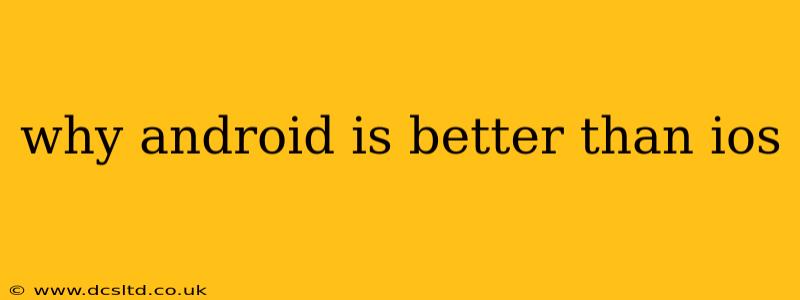The age-old debate: Android vs. iOS. While both platforms offer excellent mobile experiences, Android consistently garners praise for its flexibility and customization options. This isn't just about personal preference; there are tangible reasons why many users find Android superior. This article will explore these key advantages, addressing common questions and misconceptions.
What Makes Android Better Than iOS? A Breakdown of Key Advantages
Android's open-source nature is the foundation of its many strengths. This allows for a level of customization and flexibility simply unavailable on iOS. Let's delve into the specifics:
1. Customization: The Ultimate Personalization Powerhouse
Android shines in its ability to be tailored to individual needs. From widgets and launchers to icon packs and notification styles, you can dramatically alter the look and feel of your Android device. This degree of control appeals to users who value personalization and want a truly unique mobile experience. iOS, in contrast, offers a more limited range of customization options.
2. Open Source: Freedom and Flexibility
Being open-source means Android's code is publicly available. This fosters a vibrant developer community, leading to a wider range of apps and greater innovation. This open ecosystem allows for more diverse app choices, often including alternatives to popular iOS apps.
3. Hardware Diversity: A Wider Range of Choices
Android's open nature extends to hardware. You'll find Android devices across a vast spectrum of price points, manufacturers, and features. This diverse selection ensures there's an Android phone for virtually every budget and need. iOS, on the other hand, is primarily limited to Apple's own hardware.
4. Expandable Storage: Embrace the Freedom of Extra Space
Many Android devices offer expandable storage via microSD cards. This allows you to easily increase your phone's storage capacity, a significant advantage for users who consume a lot of media or download numerous apps. iOS devices generally lack this option.
5. More Control Over System Permissions:
Android offers granular control over app permissions. You can selectively grant or deny specific permissions to individual apps, enhancing your privacy and security. While iOS also manages permissions, Android's approach tends to be more transparent and customizable.
Frequently Asked Questions (FAQ)
Here we tackle some common questions surrounding the Android vs. iOS debate:
Is Android More Secure Than iOS?
The security landscape for both platforms is constantly evolving. While Apple's tightly controlled ecosystem offers a streamlined security approach, Android's open nature presents both advantages and disadvantages. Security concerns often depend more on individual user practices and the specific device and apps used rather than the operating system itself. Regular software updates and mindful app downloads are crucial for security on both platforms.
Which OS Has Better App Support?
Both platforms boast extensive app stores with millions of apps. While some popular apps may launch on iOS first, Android's larger user base often leads to a wider variety of apps overall, including niche or regionally specific ones.
Does Android Drain Battery Faster Than iOS?
Battery life depends on various factors including hardware, usage patterns, and apps. While generalizations are difficult, some users report better battery life on iOS devices. However, advancements in Android battery optimization have significantly improved battery performance in recent years.
Which OS is Easier to Use?
Both iOS and Android offer user-friendly interfaces. iOS is often praised for its simplicity and intuitiveness, while Android provides more flexibility and control, which might initially seem more complex to some users. Ultimately, the "easier" OS depends on individual preferences and tech proficiency.
Which is better for gaming?
The gaming landscape on both platforms is competitive and vibrant. While iOS traditionally had a stronger emphasis on mobile gaming, Android has steadily closed the gap with its increased processing power and expanding gaming titles. The "better" platform comes down to individual game preferences and device capabilities.
Conclusion: Choosing the Right OS
The "better" operating system ultimately depends on individual needs and priorities. iOS prioritizes ease of use and a tightly controlled ecosystem. Android prioritizes customization, flexibility, and open-source principles. Understanding these core differences empowers you to make an informed decision that aligns with your mobile experience expectations.
